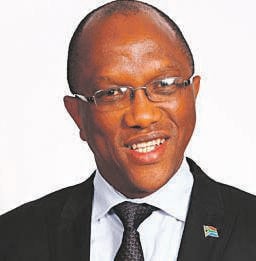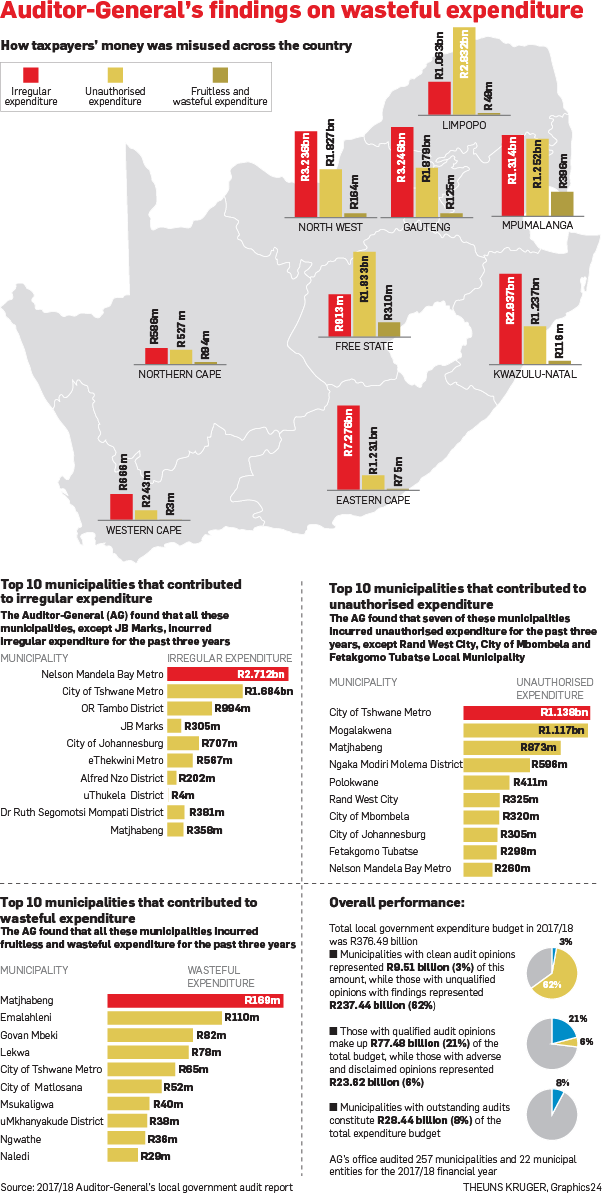
New legislation gives Auditor-General a set of sharp teeth
Auditor-general Kimi Makwetu has 26 government institutions that are perceived to be serial misusers of taxpayers’ money in his sights.
Speaking to City Press on Wednesday following the tabling of the 2017/18 local government audits in Pretoria, Makwetu said his office would soon activate his newly acquired powers to hold wrongdoers to account and possibly refer their cases for criminal prosecution.
The 26 would be the first batch – if found guilty – to be issued with a certificate of debt in a effort to recoup some of the billions of mismanaged public funds.
The amended Public Audit Act extended Makwetu’s powers to go after culprits allegedly responsible for irregular, unauthorised and wasteful expenditure.
It was signed into law by President Cyril Ramaphosa in November.
Material irregularity is defined in the act as fraud, theft, breach of a fiduciary duty or noncompliance with or contravention of the law that could result in a material loss, the misuse or loss of a material public resource or substantial harm to a public sector institution or the public.
In the 2017/18 financial year, Makwetu identified material noncompliance with key legislation at 92% of the municipalities – an increase from 85% in 2016/17, which was the highest level of noncompliance with laws since the 2011/12 financial year.
The act would not be implemented retrospectively, meaning those who had misused public finances in 2017/18 and in previous years would not be targeted unless some of them had a history of irregular expenditure and could form part of the 26 identified government institutions.
However, from the beginning of April, when the act came into effect, auditees would be held accountable.
The financial year for municipalities ends in June and ends for government departments in March.
This means offenders for the financial years ending after April 1 could face the wrath of Makwetu’s office, especially those with a history of committing irregular expenditure.
Those likely to be held accountable in government departments include ministers, members of executive councils, directors-general, superintendents-general, heads of departments and chief financial officers; in municipalities, mayors, councillors and municipal managers would have to account.
Makwetu said a decision had been made by his office to go after culprits in a phased approach.
“So, based on certain criteria, we took a view to identify a selection of municipalities and departments – those we are going to start with because it is a massive effort. You can’t implement a big amendment like this once in one year, otherwise people are going to fall over,” Makwetu said.
Sixteen government departments, the finances of which are legislated in terms of the Public Finance Management Act, and 10 municipalities, the finances of which are legislated in the Municipal Finance Management Act, were identified for the first phase.
He declined to disclose them, only saying they were spread across the provinces.
The criteria used, he said, were based on historical knowledge relating to questionable misuse of public finances.
“It’s largely things such as a history of irregular expenditure. It’s issues around the particular department’s significance in respect of its delivery on different projects and other considerations.
“It’s a combination of things that we’ve looked at, but we thought we needed to have [wide] coverage so that we didn’t have a concentration in one area and not in other areas. It was also really to make sure that, having trained the people and having applied ourselves to the implications of this, we can at least make a start,” Makwetu said.
He said that, for years, recommendations his office had made had been largely ignored by auditees.
His recommendations were previously not binding. However, the act now guarantees that remedial actions issued by his office would be binding.
Before referring matters for investigation or issuing a certificate of debt to those responsible, Makwetu’s office would ask those affected to comply with recommendations and remedial actions for a prescribed time.
They could make representations to an independent body – still to be constituted – to challenge his findings.
 |
| ||||||||||||
| |||||||||||||




 Publications
Publications
 Partners
Partners









